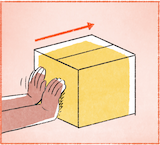
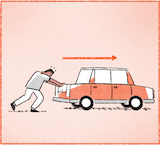
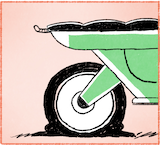
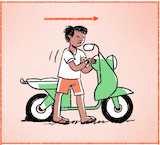
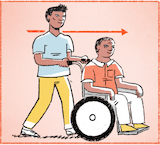
เขากำลังเฮ็ดหญัง เขากำลังใซ้มือของเขานั้นหละ ใซ้มือของเขาสองข้าง กำลังซูด
ซูดอี่หยังหละบัดหนิ กำลังซูดก่อง ก่องสี่เหลี่ยมดอก ก่องบักใหญ่ ใหญ่พอสมควนหนิหละ ใหญ่พอเท่าๆ หนิหละ บ่ใหญ่หลาย เขากำลังใซ้มือสองข้างของเขาซูดก่องนั้นไปทางหน้า
แล้วเขาซูดก่องอันนี้เป็นหญัง กะอาดสิญ้ายหม้องหลือว่าเปี่ยนหม้องกะได้ วางก่องอยู่หม้องนี้อาดสิบ่สะดวก หลือว่ามันเกะกะ เขากะเลยสิได้ซูดก่องไปไว้หม้องใหม่ หลือว่าไว้มุมใหม่
17
เขากำลังเฮ็ดหญัง กะมีพุซายพุหนึ่ง เขากำลังญู้ลดของเขา ญู้ไปทางหน้าพุ้นหละ ใซ้มือของเขาญู้ลดเก็งของเขา
เป็นหญังเขาคือญู้ลดเก็งของเขา อันนี้กะบ่ฮู้คือกัน กะเดาว่าอาดสิเป็นแบบว่าลดเก็งของเขายางฮั่ว หลือว่าลดพัง หลือว่าลดเสียเนาะ เขากะเลยสิญู้ลดไปทางหน้า เพื่อที่ว่าสิเอาลดคันนี้ไปส้อม หลือว่าไปล้านส้อมเนาะ เขากะเลยใซ้มือของเขาญู้ลดไปเลี้ยยๆ ไปเลี้ยยๆ ไปเลี้ยยๆ พุ้นแหล้ว
18
ลดคันนี้เป็นอี่หยัง ลดคันนี้ยางฮั่ว
อันนี้เบิ่งดีๆ แล้วอาดสิเป็นลดมอเตอไซเนาะ เป็นลดมอเตอไซคันน้อยๆ คันบ่ใหญ่ปานใด ยางมันกำลังฮั่ว ยางแบ็นนั้นหละเนาะความหมาย
เป็นหญังยางลดคือฮั่ว เป็นหญังยางลดคือแบ็น อันนี้กะจักคือกัน ลดคันนี้อาดสิขับไป ลดคันนี้อาดสิไปเหยียบตะปู หลือว่าเหยียบน้ำ เหยียบเหล็กอี่หยังกะได้ ที่เฮ็ดให้ยางมันฮั่ว หลือว่าเฮ็ดให้ลด ล้อลดมันแฟบลงเนาะ
19
เขากำลังเฮ็ดหญัง พุซายพุนี้ หลือว่าเด็กน้อยพุนี้ เขากำลังญู้ลดมอเตอไซของเขาอยู่
อาดสิญู้ไปทางหน้า หลือว่าญู้ไปเลี้ยยๆ กะได้
เป็นหญังเขาคือญู้ลดมอเตอไซของเขา ลดมอเตอไซของเขาฮั่ว เขากะเลยญู้ เพาะว่าลดมอเตอไซฮั่วหนะ มันขี่บ่ได้ ขั้นขี่ไปล้อลดมันกะสิเพ ล้อลดมันกะสิพัง
เพาะสะนั้นแล้วเขาต้องญู้เอา เพื่อที่ว่าเขาสิเอาไปส้อม เอาลดคันนี้ไปส้อม หลือว่าเอาล้อเอาลดของเขาเนี้ยไปปะให้มันเซาฮั่ว เพื่อที่ว่าสิสูบลมเข้าไป ให้มันสามาดขี่ได้คือเก่า
20
เขากำลังเฮ็ดหญัง กะมีพุซายพุหนึ่งเนาะ อาดสิเป็นวัยทอง บ่ทันได้เถ้าปานใด เขากำลังญู้ลดเข็นอยู่
อาดสิเป็นลดเข็นคนป่วย หลือว่าลดเข็นพ่อของเขา หลือว่าลดเข็นพุเถ้าเนาะ
เขากำลังญู้ไปทางหน้า อาดสิญู้เหล้น ญู้ซ้ายญู้ขวาญู้พาพุเถ้าไปเพิดเพิน หลือว่าไปเหล้นหม้องนั้นหม้องนี้เนาะ เพาะว่าพุเถ้าคนนี้อาดสิญ่างบ่ได้ อาดสิเถ้าคัก อาดสิเถ้าหลาย บ่มีกำลังหลือว่าบ่มีแฮงญ่างเนาะ
Link to overview page
Link to dictionary
| Isaan | Pronunciation | Tones | Thai | English/Notes |
|---|---|---|---|---|
| เขา | khao | M | เขา | personal pronoun: he, she |
| กำลัง | gam-laŋ | M-HR | กำลัง | auxiliary indicating continuous or progressive action |
| เฮ็ด | het | H | ทำ | to do, to make |
| หญัง | ɲaŋ | M | อะไร, เป็นหญัง = ทำไม | 1. what {เขากำลังเฮ็ดหญัง = What is he doing?} {ธูปเอาไว้เฮ็ดหญัง = What are incense sticks for?} 2. something, anything, (nothing) 3. เป็นหญัง[...]คือ in initial position: why {เป็นหญังเขาคือใส่บักพิกลงไปในกวยเตียว = Why is he putting chili in [his] noodle soup?} {เป็นหญังหน้าต่างมันคือเปิด = Why is the window open?} {เป็นหญังมันคือมีควนไฟ = Why is there smoke?} |
| ใซ้ | sai | HF | ใช้ | to use |
| มือ | mʉ: | HR | มือ | 1. hand 2. front leg/paw (e.g., of a cat) |
| ของ | khɔ:ŋ | M | ของ | of, belonging to |
| นั้นหละ | nan-la | HF-M | นั่นแหละ | auxiliary for emphasis at the end of a phrase |
| สอง | sɔ:ŋ | M | สอง | two |
| ข้าง | kha:ŋ | LF | ข้าง | 1. side {มีหูจับสองข้าง = there are handles on both sides} 2. next to {วางอยู่ข้างๆ ก่องใบใหญ่ = it's placed next to the large box} {เขายืนอยู่ข้างๆ อีกพุหนึ่ง = he's standing next to another person} 3. clf. for body parts which come in pairs (eyes, ears, legs etc.) {เขามีตาสองข้าง = she has two eyes} |
| ซูด | su:t | HF | เคลื่อนที่ | to move |
| อี่หยัง | i:-yaŋ | H-M | อะไร | 1. what {นี้คืออี่หยัง = What is this?} {มื้อนี้เจ้าเฮ็ดอี่หยัง = What are you doing today?} {กินเข้างายกับอี่หยัง = What did you have for breakfast?} 2. something, anything, (in negations) nothing {บ่ต้องเฮ็ดอี่หยังอีกเลยนอกจากใส่ปุย = [we] don't need to do anything besides adding fertilizer} |
| หละ | la | M | แหละ, ล่ะ | 1. auxiliary for emphasis at the end of a phrase 2. auxiliary to create a follow-up question: And what about ... ? {แล้วลดคันที่สองหละ = And what about the second car?} |
| บัดหนิ | bat-ni | M-M | [...] บัดหนิ = ทีนี้ [...] | final particle: adds a sense of immediacy |
| ก่อง | gɔŋ | H | กล่อง | box, case, package |
| สี่เหลี่ยม | si:-li:am | H-H | สี่เหลี่ยม | rectangle, square |
| ดอก | dɔ:k | LF | หรอก, ดอก | 1. particle used after a negative, relativizing or explanatory statement to make the sense milder {กินเข้าบ่ บ่กินดอก = Are you going to eat [with us]? No.} {เป็นก้อนสี่เหลี่ยม ก้อนน้อยๆ ดอก = These are cubes, small cubes.} {แล้วกะมีลดคันหนึ่งขี่ผ่านมา เป็นลดเก็งดอก = And there's a car passing, a sedan.} 2. particle used to emphasize (not necessarily a negative) contrast 3. particle used for emphasis {ดอกไม้นี้งามบ่ กะงามอยู่ เบิ่งงามๆ ดอก = Is this flower beautiful? Yes, it's beautiful, it looks beautiful} |
| บัก | bak | M | 1. intensifier before adjectives {ปาโตบักใหญ่ = a (very) large fish} 2. prefix in front of fruits and vegetables {บักแตงโม = watermelon} 3. can be used as a reference for a male person of the same or younger age {บักอันนี้ = this lad} |
|
| ใหญ่ | ɲai | H | ใหญ่ | large, big |
| พอสมควน | phɔ:-som-khu:an | HR-M-HR | พอสมควร | moderately, fairly, rather |
| หนิหละ | ni-la | M-M | นี่แหละ | auxiliary for emphasis at the end of a phrase Notes: variant of นี้หละ |
| พอ | phɔ: | HR | พอ | 1. just when, just after, as soon as 2. enough, adequate |
| เท่า | thao | H | พอดี, ไม่ไหญ่มาก | 1. not too large, appropriate size {เคี่ยงพอเท่าๆ = appropriately/moderately sized device/machine} 2. this much, that much, however much {เท่านั้น เท่านี้ = that much, this much} |
| บ่ | bɔ: | H | ไม่ | 1. no, not 2. question particle, transforming a statement into a question Notes: spelling exception in line with common usage on social media |
| หลาย | la:i | M | เยอะ, มาก | many, much, very |
| นั้น | nan | HF | นั้น | that, there |
| ไป | pai | M | ไป | 1. to go 2. auxiliary indicating action extending into the future |
| ทางหน้า | tha:ŋ-na: | HR-LF | ทางหน้า | forward, in front (of) |
| แล้ว | lɛ:o | HF | แล้ว | 1. finished 2. already 3. and then, and next (especially แล้วกะ) 4. auxiliary for past tense |
| อัน | an | M | อัน | 1. thing, object 2. general clf. for objects |
| นี้ | ni: | HF | นี้ | 1. this 2. here |
| เป็น | pen | M | เป็น | 1. to be, to exist 2. to be able to 3. to suffer, sth. happens to 4. เป็นหญัง[...]คือ in initial position: why? {เป็นหญังเขากะคือแปงฟัน = Why is he brushing his teeth?} {เป็นหญังเคี่ยงบินมันคือสิตก = Why is the airplane falling down?} |
| กะ | ga | M | ก็ | 1. then, consequently 2. also |
| อาด | a:t | LF | อาจ | 1. might, may, will 2. likely |
| สิ | si | M | จะ | future tense auxiliary {เขากำลังสิตื่น = he's about to wake up} {สิไปตะหลาด = [I'm] going to the market} |
| ญ้าย | ɲa:i | HF | ย้าย | to move |
| หม้อง | mɔŋ | LF | ที่, แห่ง, บริเวณ | 1. place, area {หลายที่หลายหม้อง = in many places} {หม้องใดหม้องหนึ่ง = some place} 2. clf. for places |
| หลือ | lʉ: | M | หรือ | or |
| ว่า | wa: | H | ว่า | 1. that, as {คำว่า X = the word X} 2. to say |
| เปี่ยน | pi:an | H | เปลี่ยน | to change, to transform |
| ได้ | dai | HF | ได้ | 1. can 2. to get, to obtain 3. before verb: indicating past tense 4. บ่ได้ + verb: not |
| วาง | wa:ŋ | HR | วาง | to place, to set/put down {โทละสับ/phone: วางสาย = to hang up} {มีเกิบวางอยู่ในก่อง = there are shoes in the box} {มือข้างหนึ่งเขาวางอยู่เทิงโต่ะ = he's put one of his hands on the table} |
| อยู่ | yu: | H | อยู่ | 1. to be (located) at 2. yet, still 3. auxiliary indicating continuous or progressive action {ทอดปาอยู่ในกะทะ = (in the process of) frying a fish in the pan} {แม่กำลังเมี้ยนเฮียนอยู่ = mother is cleaning/tidying up the house} |
| สะดวก | sa-du:ak | M-LF | สะดวก | convenient |
| มัน | man | HR | มัน | it (also used to refer to people) |
| เกะกะ | ge-ga | M-M | เกะกะ | to be in the way, to be in a mess |
| เลย | lə:i | HR | เลย | 1. futher on, beyond, past {เข็มน้อยเลยเลขสิบสองไป = the minute hand has passed number twelve} 2. too much 3. at all 4. definitively 5. completely, utterly |
| ไว้ | wai | HF | ไว้ | 1. to keep, to put, to place, to retain, to save, to reserve {เขาเอาหัวของเขาไว้ใส = Where does she put her head?} {หมาสิเลี้ยงไว้บ้าน = dogs are kept/raised in the house} {ไก่เลี้ยงไว้ในคอก = chicken are kept/raised in a coop} {หน้ามันบังไว้ = the face is covered/not visible} {เขาเอาโทละสับวางไว้หู = he holds the phone to his ear} 2. for {นาลิกาปุกมีไว้เฮ็ดหญัง = What is an alarm clock for?} {หม้อเอาไว้เฮ็ดแนวกิน = a pot is used to make food} {ก่องเอาไว้เฮ็ดหญัง ก่องเอาไว้ใส่ของ = What is the box for? It's for putting in stuff.} Notes: see also ไว้ถ้า |
| ใหม่ | mai | H | ใหม่ | new |
| มุม | mum | HR | มุม | 1. corner 2. [figuratively] place |
| มี | mi: | HR | มี | 1. to have 2. there is |
| พุซาย | phu-sa:i | H-HR | ผู้ชาย | man, male |
| พุ | phu | H | ผู้ | 1. person 2. clf. for people {พุหญิงพุหนึ่ง พุซายพุหนึ่ง = a woman, a man} {ซู่พุซู่คน = everybody} {พุหนึ่งโตจ่อยๆ พุหนึ่งโตบักอ้วนหนึ่ง = one person is slim, the other is fat} Notes: pronunciation: also realized as พู่- |
| หนึ่ง | nʉŋ | H | หนึ่ง | 1. one 2. after adjective: intensifier {บักคักหนึ่ง = very much} {อันบักใหญ่หนึ่ง = very large}, or attenuates the meaning {กะดาดมันแผ่นน้อยๆ หนึ่ง = the piece of paper is [relatively] small} |
| ญู้ | ɲu: | HF | ผลักไปข้างหน้า | to push forward Notes: used with vehicles |
| ลด | lot | H | รถ | 1. car, motorized vehicle 2. vehicle, cart {ลดขายแนวกิน = food cart} |
| พุ้นหละ | phun-la | HF-M | นู่นแหละ | auxiliary for emphasis at the end of a phrase Notes: see also พุ้นหนะ |
| ลดเก็ง | lot-geŋ | H-M | รถเก๋ง | car (sedan) |
| คือ | khʉ: | HR | คือ | 1. to be, to resemble, like, as 2. why {บักหล้าคือบ่เก็บโต่ะแน่ = [addressing a young boy] Why haven't you cleared the table?} |
| ฮู้ | hu: | HF | รู้ | 1. to know 2. to understand Notes: equivalent to ลู้ |
| คือกัน | khʉ:-gan | HR-M | เหมือนกัน | 1. also, likewise, similarly {ยินดีที่ได้ฮู้จักคือกันคับ = Nice to meet you too!} 2. in negative sentences: either {บ่ลู้คือกัน = I don't know either} {จักคือกัน = I don't know (either)} |
| เดา | dao | M | เดา | to guess {เดาบ่ถืก = [I] can't guess it} {กะเดาว่าอาดสิเป็น ... = [I] guess it could be ...} |
| แบบ | bɛ:p | LF | แบบ | 1. example, model, kind 2. style, form, pattern, design |
| ยาง | ya:ŋ | M | ยาง | 1. rubber, resin, plastic {ถุงยาง = plastic bag} 2. tyre {ลดยางแบ็น = the car has a flat tyre} |
| ฮั่ว | hu:a | H | รั่ว | to leak, to leak out {ยางฮั่ว = punctured/leaking tyre} |
| พัง | phaŋ | HR | พัง | 1. to be destroyed 2. to be damaged, broken |
| เสีย | si:a | M | เสีย | 1. to deteriorate, to go bad 2. to die {เสียซีวิด = to die, to loose one's life} |
| เนาะ | nɔ | H | เนาะ | final particle: makes the statement softer, looking for agreement |
| เพื่อที่ | phʉ:a-thi: | H-H | เพื่อที่ | in order to, so that Notes: the vowel เอือ is likely to be a Thai loan |
| เอา | ao | M | เอา | to take, to give {เขากำลังเอาก่องไปซั่ง = he's taking the boxes to weigh them} {หมอกำลังเอายาให้คนป่วยกิน = the doctor is giving medicine to the patient} {เอาไว้ถ้า = is for, is used for, has the purpose of} |
| คัน | khan | HR | คัน | clf. for cars, trains, motorbikes, boats {ลดไฟคันนี้ = this train} {ลดเก็งคันสีเขียวคันน้อย = a small green car} |
| ส้อม | sɔm | LF | ซ่อม | to repair, to fix |
| ล้าน | la:n | HF | ร้าน | shop {ล้านขายผนละไม้ = shop selling fruits} {ล้านขายเสี้ยผ้า = clothes shop} |
| เลี้ยยๆ | li:ai | HF | เรื่อยๆ | continuously Notes: pronunciation: also realized as เลื้อยๆ |
| พุ้นแหล้ว | phun-lɛ:o | HF-LF | นู่นแหละ | auxiliary for emphasis at the end of a phrase Notes: variant of พุ้นหละ |
| เบิ่ง | bəŋ | H | ดู | 1. to look at, to see, to watch {เบิ่งโทละทัด = to watch TV} {เบิ่งหนัง = to watch a movie} 2. to guess {เบิ่งซงแล้ว ... = [I] guess / from what it looks like ...} |
| ดี | di: | M | ดี | good |
| มอเตอไซ | mɔ:-tə:-sai | HR-M-HR | มอเตอร์ไซค์ | motorbike |
| น้อย | nɔ:i | HF | น้อย | 1. few, little 2. small |
| ปานใด | pa:n-dai | M-M | เท่าไหร่, มาก | 1. after negative: (not) very, (not) so much {บ่ใหญ่ปานใด = not so large, not very large} 2. how much, how many {เฮาบ่สามาดนับได้ว่ามันมีหลายปานใด = it's impossible to count how many there are} |
| แบ็น | bɛn | M | แบน | of a tyre: flat |
| ความหมาย | khwa:m-ma:i | HR-M | ความหมาย | meaning |
| จัก | jak | M | จัก | 1. answer to a question: [I] don't know, don't know exactly, [I'm] not sure {พุซายคนนี้เขาเถ้าไป่ จัก จักเถ้าหลือบ่เถ้า เบิ่งบ่ค่อยออก = Is this man here already old? I don't know. I can't see clearly whether he's old or not.} {เขาเว้ากันอยู่ใส จักคือกัน = Where are they talking? I don't know either.} 2. exact(ly), what exactly {จักต้มอี่หยังกะบ่ฮู้ = I don't know what (exactly) he is cooking} {บ่ลู้คือกันจักปาอี่หยัง = I don't know either what kind of fish this is} 3. how much/many? {ต้นไม้มีจักต้น = How many trees are there?} {ตอนนี้จักโมงแล้ว = What time is it now?} {มือของเฮานี้สิมีจักนิ้ว = How many fingers do our hands have?} 4. a bit, a little bit {จักหน่อย/จักหน่อยหนึ่ง = a bit, a little bit} |
| ขับ | khap | M | ขับ | to drive, to ride |
| เหยียบ | yi:ap | LF | เหยียบ | to step on, to tread on, to run over |
| ตะปู | ta-pu: | M-M | ตะปู | nail |
| น้ำ | na:m | HF | น้ำ | 1. water 2. drink, soft drink, juice |
| เหล็ก | lek | M | เหล็ก | iron, steel, metal |
| ที่ | thi: | H | ที่ | 1. that, which {คนที่ยืนอยู่ฝั่งขวา = the person which is standing on the right = the person standing on the right} {เว้าคำที่บ่สุพาบ = to speak words which are impolite = to speak impolitely} 2. for ordinal numbers {ที่สาม = third} |
| ให้ | hai | LF | ให้ | 1. to give {หมอกำลังเอายาให้คนป่วยกิน = the doctor is giving the patient medicine} 2. for 3. to allow, to be allowed |
| ล้อ | lɔ: | HF | ล้อ | wheel |
| แฟบ | fɛ:p | HF | แฟบ | to become flat, to deflate |
| ลง | loŋ | HR | ลง | 1. to descend, to lower, to go down 2. down 3. bus/train etc.: to get off, to disembark {คนกำลังลงลดบั่ด = people are getting off the bus} 4. boat/ship etc.: to get on, to board {เขากำลังญ่างลงเลีย = he's boarding/getting on the boat} |
| เด็กน้อย | dek-nɔ:i | M-HF | เด็ก, เด็กน้อย | child |
| เพาะว่า | phɔ-wa: | H-H | เพราะว่า | because |
| หนะ | na | M | final particle | |
| ขี่ | khi: | H | ขี่ | to ride, to drive {ขี่มอเตอไซ = to ride a motorbike} {ขี่ควย = to ride on a buffalo} {ขี่เลีย = to take or travel on a boat} |
| ขั้น | khan | LF | เมื่อ | when, if |
| เพ | phe: | HR | เพ, พังทลาย, พัง, เสีย | 1. to fall apart 2. to destroy, wreck, demolish 3. to suffer damage 4. broken, damaged, destroyed Notes: translation to be confirmed |
| เพาะสะนั้นแล้ว | phɔ-sa-nan-lɛ:o | H-M-HF-HF | เพราะฉะนั้นแล้ว | therefore, for that reason, consequently Notes: pronunciation: also realized as เพาะฉะนั้น |
| ต้อง | tɔŋ | HF | ต้อง | to have to, must |
| เอา | ao | M | เอา | after a verb: expresses focus and continuity |
| เนี้ย | ni:a | HF | เนี้ย | variant of นี้ = this, here |
| ปะ | pa | M | ปะ | to patch (e.g., a tyre) |
| เซา | sao | HR | จบ | 1. to stop, to be finished {น้ำมันเซาไหลแล้ว = the water has stopped flowing} {ฝนเซาตกแล้ว = it has stopped raining} {มันสิเซาเสียงดัง = (phone) it stops ringing loudly} 2. to prevent, to hinder 3. to rest {เซาเมี่ยย = to rest} |
| สูบ | su:p | LF | สูบ | to pump |
| ลม | lom | HR | ลม | wind |
| เข้า | khao | LF | เข้า | to enter, to go inside, to come/go in/on {เข้าห้องน้ำ = to go to the bathroom} {เข้านอน = to go to bed} {ขี่เลียเข้าไปเกาะ = to take a boat to go on an island} |
| สามาด | sa:-ma:t | M-HF | สามารถ | can, to be able |
| คือเก่า | khʉ:-gao | HR-H | as before | |
| วัยทอง | wai-thɔ:ŋ | HR-HR | วัยทอง [?] | to be middle-aged Notes: seems to be describe a younger age than Thai วัยทอง = elderly |
| บ่ทันได้ | bɔ:-than-dai | H-HR-HF | ยังไม่ได้ | not, not yet {บ่ทันได้กินเข้า = [I] haven't eaten yet} {อายุบ่ทันได้หลาย = not yet old} {เขาอาดสิบ่ทันได้เถ้ากะได้ = maybe he's not yet (that) old} Notes: see also ทันได้ which is apparently equivalent |
| เถ้า | thao | LF | แก่, เฒ่า | age: old |
| ลดเข็น | lot-khen | H-M | รถเข็น | wheelchair |
| คนป่วย | khon-pu:ai | HR-H | คนป่วย | patient, sick person Notes: see also พุป่วย |
| พ่อ | phɔ: | H | พ่อ | father |
| พุเถ้า | phu-thao | H-LF | ผู้เฒ่า | old person |
| เหล้น | len | LF | เล่น | 1. to play, to enjoy oneself with, to do something for pleasure {เหล้นลูกบอน = to play ball} {เหล้นเกม = to play a game/games} {เหล้นน้ำ = to play with/in the water} {นั่งเหล้น = to sit} {กินเหล้น = to eat (as a snack), to snack} {เหล้นโน่ดบุ่ก = to use a laptop (for entertainment or work)} 2. to drop by, to spend time with, to come to visit {บ่ได้มาเฮ็ดหญัง มาเหล้นซื่อๆ = I've not come to do anything in particular, I'm just dropping by} |
| ซ้าย | sa:i | HF | ซ้าย | left |
| ขวา | khwa: | M | ขวา | right |
| พา | pha: | HR | พา | 1. to guide, to lead, to accompany {หมา: พามันไปเหล้น = dog: [I] took/brought him to play} 2. plural marker for verbs, to be doing sth. together {เขาพากันใส่ส้ง = they are all wearing trousers} {เขากำลังพากันเฮ็ดหญัง เขากำลังพากันส้างบ้านส้างเฮียน = What are they doing? They're building a house.} |
| เพิดเพิน | phə:t-phə:n | HF-HR | เพลิดเพลิน | to enjoy, to be entertained, to take pleasure in |
| คน | khon | HR | คน | person, people |
| ญ่าง | ɲa:ŋ | H | เดิน | to walk {เขากำลังญ่างเว้ากัน = they are walking and talking} {ลูกเป็ดญ่างไปนำแม่เป็ด = the ducklings are [walking] following their mother} {เขากำลังญ่างข้ามสะพาน = she's walking over the bridge} {เขาสิญ่างไปใส = Where is he going?} |
| คัก | khak | H | intensifier: very, very much | |
| กำลัง | gam-laŋ | M-HR | กำลัง | power, energy, strength |
| แฮง | hɛ:ŋ | HR | แรง | 1. strong {ลมกำลังพัดแฮงอยู่ = to wind is blowing strongly} 2. loud {เสียงแฮง = loud} 3. strength, power |